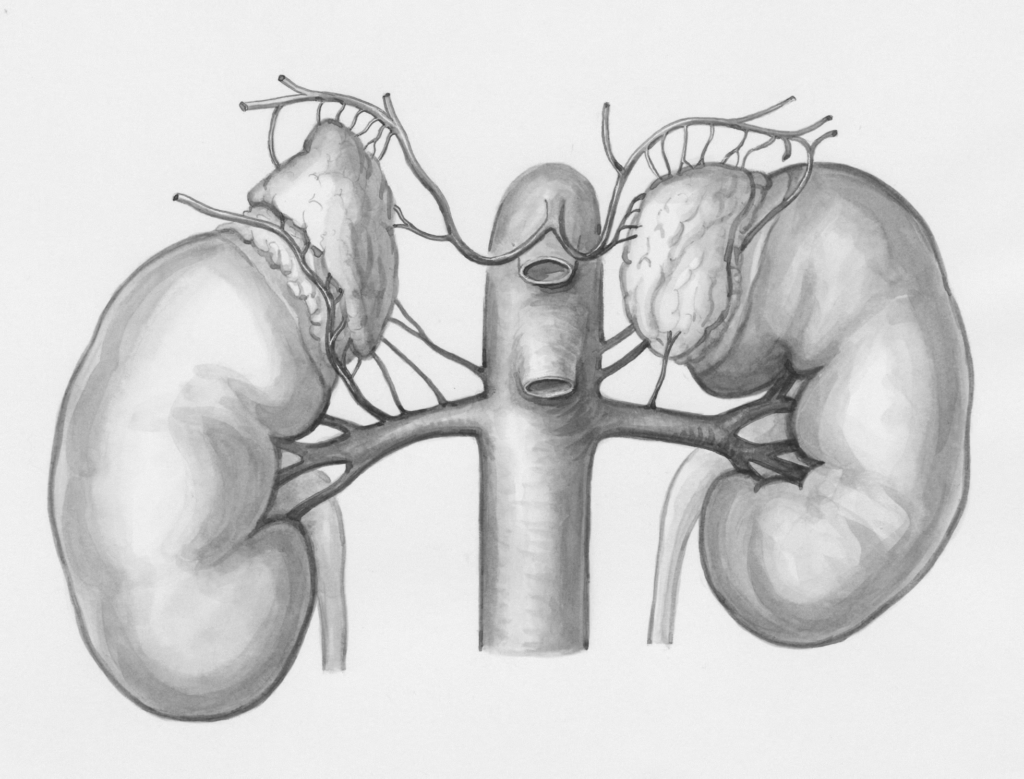A Utah mother’s life took a heartbreaking turn when seemingly ordinary health complaints revealed rare cancer symptoms. Angela Goodrich, a 41-year-old dedicated mother of 10 children, passed away in February 2023, just weeks after doctors diagnosed her with adrenocortical carcinoma, an aggressive cancer affecting the adrenal glands.
A Mother’s Sudden Diagnosis

In January 2023, Angela began feeling unusually tired, which didn’t seem alarming at first. With 10 kids between the ages of 2 and 19, fatigue felt expected. But when persistent abdominal pain joined the exhaustion, her husband Nate urged her to see a doctor. The diagnosis blindsided them: a softball-sized tumor in her adrenal gland had already spread to her lungs and liver. Angela had stage 4 adrenocortical carcinoma, an aggressive and extremely rare cancer that affects just one or two people per million each year. Five weeks later, she passed away, leaving behind Nate and their 10 children.
Understanding The Rare Cancer Symptoms in Adrenocortical Carcinoma

Adrenocortical carcinoma begins in the outer layer of the adrenal glands, located above each kidney. These small glands play a major role in the body by producing hormones that regulate metabolism, blood pressure, and the stress response. When cancer develops here, it can interfere with these essential functions and produce uncommon symptoms. The disease often remains unnoticed until the tumor grows large enough to press on nearby organs or spreads to other areas. At that point, treatment options become limited, and the prognosis turns more serious. This happened in Angela’s case. Doctors link about 15 percent of cases to genetic conditions such as Li-Fraumeni syndrome. However, most develop without a known cause, making prevention difficult and early detection critical. Because it affects only one or two people per million each year, doctors may not immediately suspect it when symptoms appear vague.
Warning Symptoms: Rare Cancer Unnoticed

Looking back, Angela showed several signs of rare cancer that were easy to miss. She gained weight without changing her diet, her fatigue worsened, and her abdominal pain intensified. She developed high blood pressure without a clear reason, and family members noticed mood shifts and irritability that didn’t seem characteristic of her. People easily overlook these symptoms. Many, especially busy parents, assume they’re just dealing with stress or the wear and tear of everyday life. “There were signs that, in hindsight, we should have paid more attention to,” Nate said. “But who thinks you have rare cancer when you’re tired and have a bit of stomach pain?”
When Cancer Spreads Quickly

By the time doctors diagnosed Angela, the cancer had spread from her adrenal gland to her lungs and liver. The primary tumor had grown to the size of a softball, showing how quickly these rare cancer symptoms can escalate and limiting treatment options. Adrenocortical carcinoma progressed rapidly in Angela’s case, with her health declining quickly after diagnosis. Few treatments could help due to the advanced stage. “We went from thinking she had a stomach bug to planning for end-of-life care in what felt like no time at all,” Nate said. The family had barely processed the diagnosis before saying goodbye, a common experience in late-stage cases.
Family’s Response to the Diagnosis

The diagnosis devastated the Goodrich family. The children struggled to understand why their mother, who had always been their anchor, suddenly became so sick. “The kids kept asking when mom would get better,” Nate said. “Trying to explain to a 2-year-old that mom isn’t coming home is something no parent should have to do.” Even as her health declined, Angela stayed focused on her children. In her final weeks, she poured her energy into creating lasting memories. She wrote letters for future milestones and recorded personal messages for each child to hold onto after she was gone.
Community Support During Rare Cancer Symptoms Crisis

When Angela’s diagnosis spread through Hurricane, Utah, the community rallied around the Goodrich family. A GoFundMe campaign raised over $30,000 for medical costs and the children, while church groups organized meals, childcare, and household help. Local businesses contributed services and supplies. “The outpouring of love has been incredible,” Nate said. “People we barely know have helped our family in ways we never imagined.” Angela’s obituary described her as a devoted mother who found joy in serving others, a legacy that continues as her kindness inspires the community’s ongoing care for her family.
Risk Factors to Be Aware Of

Although adrenocortical carcinoma occurs rarely, understanding the potential risk factors can help identify rare cancer symptoms and support early detection. Some inherited genetic syndromes, especially Li-Fraumeni syndrome, are associated with a higher risk. In some cases, cancer that has spread to the adrenal glands or long-term hormone imbalances can increase risk. Medical data show that women develop this cancer slightly more often than men. Knowing your family’s medical history and sharing it with your doctor can guide risk assessment. For those with known risks, regular check-ups can help catch signs earlier.
Importance of Early Detection

Angela’s story highlights the importance of early detection in rare cancers. When doctors catch adrenocortical carcinoma early, patients have more treatment options and better outcomes. Experts recommend seeing a doctor if you experience unexplained weight changes or abdominal swelling, persistent pain without a clear cause, unusual fatigue that doesn’t improve with rest, or sudden high blood pressure. Also, watch for changes in body hair or other unusual hormonal symptoms.
A Mother’s Lasting Legacy

“We hope sharing Angela’s story helps another family recognize these symptoms earlier,” Nate said. “If even one person gets checked sooner because of what happened to Angela, it would mean so much to us.” Though people often overlook rare cancer symptoms, Angela’s story reminds us that we should always take persistent health changes seriously. Her legacy lives on through her children and the awareness her story brings to this rare and devastating disease.

